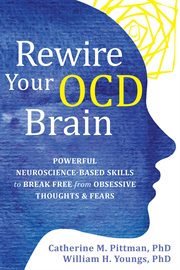Nonfiction
eBook
Details
PUBLISHED
Made available through hoopla
DESCRIPTION
1 online resource
ISBN/ISSN
LANGUAGE
NOTES
Rewire the brain processes that cause obsessions and compulsions-and take back your life! If you've ever wondered why you seem to get trapped in an endless cycle of obsessive, compulsive thoughts, you don't have to wonder anymore. Grounded in cutting-edge neuroscience and evidence-based cognitive behavioral therapy (CBT), Rewire Your OCD Brain will show you how and why your brain gets stuck in a loop of obsessive thinking, uncertainty, and worry; and offers the tools you need to short-circuit this response and get your symptoms under control-for good. Written by clinical psychologist Catherine Pittman and clinical neuropsychologist William Youngs, this groundbreaking book will show how neurological functions in your brain lead to obsessions, compulsions, and anxiety. You'll also find tons of proven-effective coping strategies to help you manage your worst symptoms-including relaxation, exercise, healthy sleep habits, cognitive restructuring, cognitive defusion, distraction, and mindfulness. The brain is powerful, and the more you work to change the way you respond to obsessive thoughts, the more resilient you'll become. If you're ready to rewire the brain processes that lie at the root of your obsessive thoughts, this book has everything you need to get started today. What causes obsessive thoughts and compulsions, and how can you stop them at the source? Written by a clinical psychologist and a clinical neuropsychologist, Rewire Your OCD Brain offers strategies based in cutting-edge neuroscience to help readers rewire the brain processes that cause their worst symptoms of obsessive-compulsive disorder (OCD). Readers will find a wealth of tools and practices for dealing with OCD, including relaxation, habit-change, cognitive restructuring, cognitive defusion, distraction, and mindfulness. Catherine M. Pittman, PhD, is a licensed clinical psychologist specializing in the treatment of brain injuries and anxiety disorders. She is professor of psychology at Saint Mary's College in Notre Dame, IN. William H. Youngs, PhD, is a clinical psychologist with a private practice in clinical neuropsychology in the greater South Bend, IN, area. He has been a clinical neuropsychologist with Memorial Hospital of South Bend for twenty-five years, and a visiting assistant professor of psychology at Saint Mary's College in Notre Dame, IN, where he has taught undergraduate courses in neuroscience, cognitive psychology, psychological assessment, abnormal psychology, and theories of personality. Pittman resides in Plymouth, IN; Youngs resides in Mishawaka, IN
Mode of access: World Wide Web







